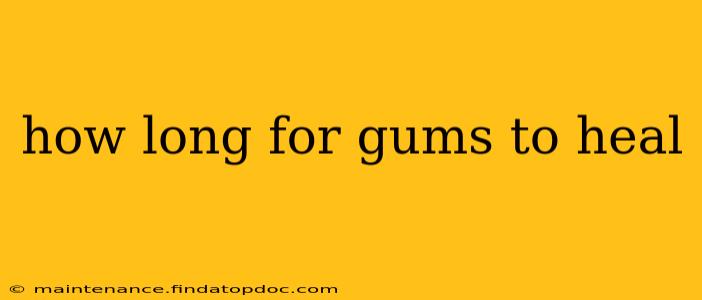Gum healing time varies greatly depending on the severity and type of injury or condition. A minor irritation might heal in days, while a surgical procedure could take weeks or even months. This comprehensive guide will explore the factors influencing gum healing and answer common questions.
What Factors Affect Gum Healing Time?
Several factors influence how quickly your gums heal. These include:
- Severity of the injury or condition: A simple cut or abrasion will heal much faster than a severe gum infection or the aftermath of gum surgery (like a gum graft).
- Overall health: Individuals with underlying health conditions, such as diabetes or compromised immune systems, may experience slower healing times. Properly managed conditions are key to faster recovery.
- Oral hygiene: Maintaining excellent oral hygiene practices, including regular brushing, flossing, and rinsing with an antiseptic mouthwash (as directed by your dentist), is crucial for preventing infection and promoting healing.
- Smoking: Smoking significantly impairs healing and increases the risk of complications. Quitting smoking, even temporarily, is highly recommended for optimal gum recovery.
- Medication: Certain medications can affect healing. Discuss any medications you're taking with your dentist or doctor.
- Nutrition: A balanced diet rich in vitamins and minerals supports the body's natural healing processes.
How Long Does It Take for Minor Gum Injuries to Heal?
Minor gum injuries, such as small cuts or abrasions from brushing too vigorously or accidentally biting your cheek, typically heal within a few days to a week. Good oral hygiene is paramount during this period to prevent infection. If the bleeding persists or worsens, consult your dentist.
How Long Does It Take for Gums to Heal After Gum Surgery?
Gum surgery recovery time varies depending on the procedure's complexity. Simple procedures may heal within a couple of weeks, while more involved surgeries, like gum grafts or flap surgery, can take several weeks or even months for complete healing. Your dentist will provide specific post-operative instructions to facilitate the healing process.
How Long Does It Take for Gum Disease to Heal?
The healing time for gum disease (gingivitis and periodontitis) depends on the disease's severity and the treatment approach. Early-stage gingivitis might improve within a few weeks with improved oral hygiene and professional cleaning. Advanced periodontitis requires more extensive treatment, such as scaling and root planing, and might take several months for significant improvement. In severe cases, surgery might be necessary, extending the healing timeline.
How Long Does It Take for Gums to Heal After Tooth Extraction?
The healing process after tooth extraction involves both the socket and the gums. Initial healing, including clot formation, generally takes about a week. Complete gum tissue regeneration and bone healing can take several months. Following your dentist's post-extraction instructions is vital for optimal healing.
What Are the Signs of Infection or Complications?
Keep an eye out for these signs, which may indicate infection or complications:
- Increased pain and swelling: Pain and swelling that worsen after initial improvement warrant immediate dental attention.
- Persistent bleeding: Bleeding that doesn't stop after applying gentle pressure for 20 minutes requires professional evaluation.
- Fever: A high fever could signify infection.
- Pus: The appearance of pus indicates infection.
- Redness and warmth: Increased redness and warmth around the affected area can be a sign of infection.
If you experience any of these symptoms, contact your dentist or oral surgeon immediately.
How Can I Promote Faster Gum Healing?
Beyond maintaining excellent oral hygiene, you can promote faster gum healing by:
- Following your dentist's instructions carefully: Adhering to post-operative or treatment instructions is crucial.
- Eating a nutritious diet: Focus on nutrient-rich foods that support healing.
- Avoiding smoking and alcohol: These substances hinder healing.
- Gently rinsing your mouth: Rinse gently with saltwater or a prescribed mouthwash as directed.
- Getting adequate rest: Rest helps your body heal.
Remember, this information is for general guidance only. For personalized advice and treatment, consult your dentist or oral surgeon. They can provide a precise estimate of your gum healing time based on your specific circumstances.
